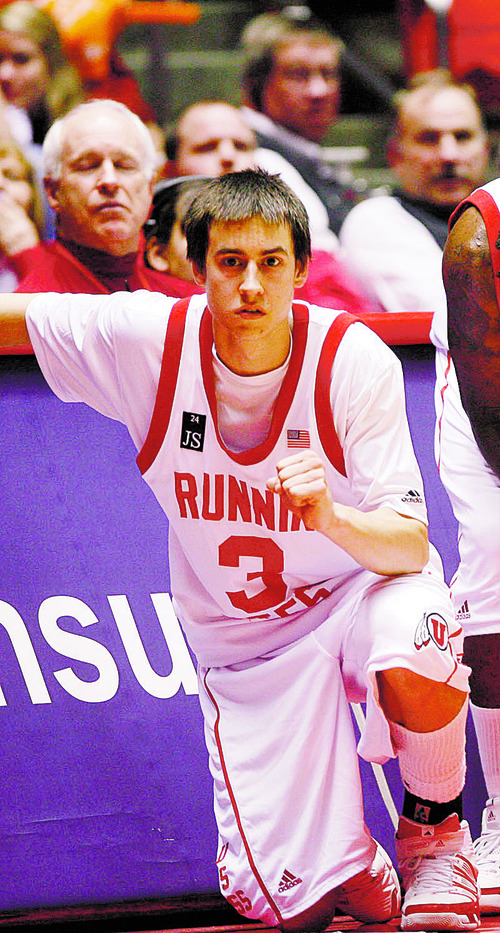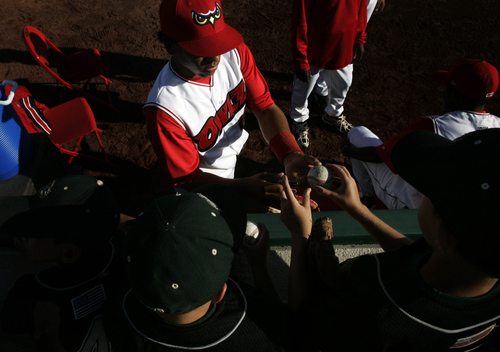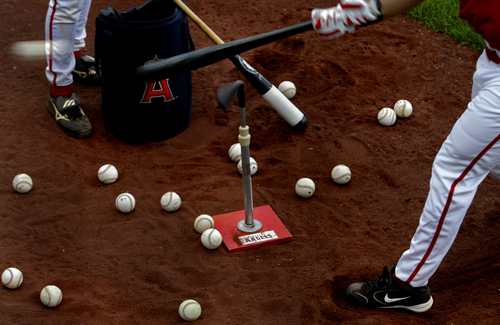This is an archived article that was published on sltrib.com in 2013, and information in the article may be outdated. It is provided only for personal research purposes and may not be reprinted.
San Bernardino, Calif. • As the Inland Empire 66ers rallied during a lengthy eighth inning last Sunday, two staff members walked through the stands behind home plate, proudly carrying a 25-pound cupcake.
Clearly, this was a job for Kobayashi.
This tour of the Los Angeles Angels' farm system had begun at Spring Mobile Ballpark, where the Salt Lake Bees hired the renowned competitive eater for a promotional contest. And now, in the 90-degree heat of a southern California evening, the 66ers employees are hoping the bottom of the eighth will end soon enough for them to declare a winner of the game-day sponsor's raffle prize — before it melts.
Minor league baseball is all about food, marketing and competition. The players climb through a series of levels in a quest of attrition — only about 10 percent will play in the major leagues — while the various teams they're assigned to around the country do everything they can to attract fans and maintain a thriving business.
"You're literally fighting over people's attention," said 66ers general manager Joe Hudson, who formerly worked for the Utah Grizzlies hockey team.
Minor league baseball's 160 teams have combined to draw at least 41.2 million fans for eight straight years, annually more than the NFL and the NBA combined. The industry overall is "a stable operation," said Bees GM Marc Amicone. "Everybody at every level makes a real effort to be a good business."
But it's not easy. Located roughly 50 miles from Angels Stadium in Anaheim, the 66ers compete for fans with their own parent club. Part of their strategy is to emphasize those ties. That explains next month's promotional giveaway of the Kole Calhoun Garden Gnome, celebrating the Inland Empire era of the outfielder who eventually joined the Angels (he's now with the Bees).
Recalling his initial thought upon learning of the 66ers' scheme, Calhoun said, "Are you kidding me? OK, it could be cool, but I mean, a garden gnome?"
Hey, whatever it takes. The players understand the promotional efforts, because they're similarly trying to distinguish themselves, hoping they can move up steadily in the organization.
"It's a grind, it's difficult," said Bobby Scales, the Angels' director of player development. "This might sound crazy, but even for guys like Mike Trout, it's difficult. On a daily basis, you have situations that arise that test how much you want to play this game."
Trout wouldn't disagree. The day he was named to start in the Major League All-Star Game, Trout stood in the dugout of Angels Stadium and both cringed and smiled about the memory of launching his career in the Arizona League only four years ago. At 17, he played front of maybe a couple of dozen fans (even with free admission) nightly, with game-time temperatures of 115 degrees or higher.
"It's a lot better up here, obviously," he said.
So they play on, hoping someday to find work in the big leagues with a minimum annual salary of $490,000, in contrast to seasonal wages of about $1,000 a month in the minors. Money is among the reasons they persevere through the system with no guarantees, even for highly drafted players.
As Scales said, "It's not for everybody."
Minor league franchises pitch the exact opposite theme. They market affordable family entertainment and an experience beyond "just the standard baseball game," Hudson said.
Even so, this tour produced notable stuff on the field, at every stop. The night Kobayashi ate 13 hot dogs in 60 seconds in Salt Lake City, the wonderfully named Tommy Field gobbled up ground balls with several spectacular plays at second base. In Burlington, Iowa, two hometown Bees lacked baserunning smarts, enabling Peoria third baseman Patrick Wisdom to make an unassisted double play — even with no force-out, after fielding a grounder.
Cal Towey walked five times in a game in Orem, accounting for 450 feet of advancement. Ex-University of Utah star C.J. Cron of the Arkansas Travelers smoked a line drive that maintained its trajectory until hitting a fence next to the scoreboard, 420 feet from home plate. In Arizona, left-handed pitcher Kyle Hunter picked off three baserunners. Andy Workman ran down fly balls from consecutive batters on the warning track in center field in San Bernardino.
And in Anaheim, the Angels rallied to tie Boston with four runs in the ninth inning, before winning in the 11th on Josh Hamilton's two-run homer.
These, then, are the tour's lessons: Expect something memorable to happen, and stick with it to the end. That's what the Angels' players at every level are doing, until they're told otherwise. —
Seven Levels of Angels
Team League Level Avg. Attn.
Los Angeles American MLB 37,104
Salt Lake PCL AAA 6,720
Arkansas Texas AA 4,475
Inland Empire California A-Advanced 2,687
Burlington Midwest A 947
Orem Pioneer Rookie-Advanced 2,321
Tempe Arizona Rookie N/A
Note • The Angels also field a rookie team in the Dominican Summer League. —
About the series
The Salt Lake Tribune's Kurt Kragthorpe spent early July on the road taking stock of the teams, players, fans and ballparks of the Los Angeles Angels and their minor league affiliates. His purpose: to ferret out great stories at each stop and, in the bigger scheme, connect the dots between what fans love about baseball — especially the minor league version — and the players toiling to make it to the bigs. The upcoming installments include:
Burlington, Iowa • The story of the smallest town in the country (25,000) that supports a full-season (April through August) professional baseball team. The Bees are a community-owned, nonprofit enterprise.
Little Rock, Ark. • Life at the ballpark takes on a whole new meaning for the six stadium operations interns the club annually hires. They live in the stadium, just beyond right field, and work for a man nicknamed Pooh Bear, the park superintendent.
Orem • The Angels/Owlz have played in Provo/Orem since 2002. They do play regularly on Sundays in Orem, unlike BYU, but still don't sell beer. The franchise has not succeeded to the level of the Ogden Raptors, but ranks about in the middle of Pioneer League attendance.
San Bernardino, Calif. • The team, called the Inland Empire 66ers, is part of the minor league sports holdings of David Elmore and Donna Tuttle, the Utah Grizzlies owners. The 66ers' hallmark is promotions.
Tempe, Ariz. • Pure baseball, at the pro entry level. No promotions, no admission charge. The Angels' manager is Denny Hocking, one of the more popular Buzz players.
Salt Lake City • This is the 20th year of the Buzz/Stingers/Bees franchise, whose debut marked the return of Triple-A baseball after an eight-year absence (mostly filled by the rookie-league Salt Lake Trappers). Larry H. Miller's purchase in 2005 stabilized the team and brought back the historic "Bees" nickname. We unveil the 20th anniversary team.
Anaheim, Calif. • This is the destination for whatever miniscule percentage of players who make it. Angels second baseman Howie Kendrick played at each of the previous six levels on his way to becoming an All-Star and one of the franchise's most consistent players.









